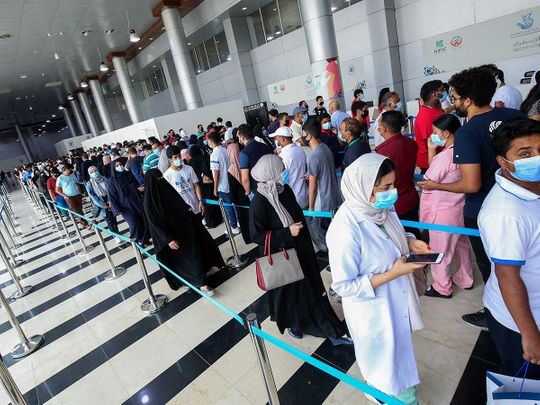
Cairo: COVID-19 infections are surging across several Gulf states, with the daily number of cases hitting a record in Kuwait and more than doubling in Saudi Arabia over two days to more than 2,500.
All six Gulf states had confirmed cases of the Omicron variant in their territories, but official daily coronavirus data does not provide a breakdown by COVID-19 variant.
Kuwait yesterday confirmed 2,246 new COVID-19 cases in the past 24 hours, the Health Ministry said. The infection is the country's highest daily rate since the start of the pandemic, according to Kuwaiti newspaper Al Jarida. The ministry also reported one more death, raising the total to 2,469.
Saudi Arabia, the largest with a population of some 30 million, on Wednesday registered 3,045 new infections for the first time since July 2020. It is still below a peak of more than 4,700 in June 2020.
Three virus-related deaths were also reported, taking the total toll in the country to 8,886.
A total of 565,482 cases have now been detected in the kingdom, and there have been 543,553 recoveries.
Numbers have been climbing rapidly in recent weeks after the first case of the Omicron variant was detected in Saudi Arabia on December 1. That case was traced to an unnamed north African country, according to the official SPA news agency.
Saudi authorities on December 30 made wearing masks in public compulsory again, after having earlier that month advised against non-essential travel overseas.
Qatar reported 1,695 new cases on Tuesday, the highest daily number since last summer.
Remote school learning
For days, crowds have queued at PCR testing sites in Qatar, which in January reintroduced remote school learning.
Soha Al Bayat, Qatar’s head of vaccination, told state television on Sunday that a spike in the last two weeks was “related to the Omicron variant” and that more recent cases were among unvaccinated individuals, including children, and people who received two doses more than six months ago.
The Ministry of Public Health (MOPH), meanwhile, announced on Wednesday the updated lists of countries classification based on severity of the COVID-19 pandemic, as part of the travel and return policy for the State of Qatar.
The Ministry stated that the work of the new lists will enter into force at 7pm next Saturday, corresponding to January 8, noting that the new update of the lists of countries can be found on its website.
It is also said that the classification of countries on the basis of the level of COVID-19 risk includes three lists — countries on the green list, countries on the red list, and countries on the exceptional red list. The currently updated Green List has 143 countries.
On the other hand, 10 countries have been added in the Red List, totaling to 57 countries. The countries added to the list are Austria, Estonia, Greece, Greenland, Hungary, Iceland, Latvia, Portugal, Trinidad and Tobago, and Turkey. No changes have been made in the Exceptional Red List Countries and remained to have nine countries.
Social events halted in Kuwait
Amid record number of cases, kuwait said all arrivals are required to present a negative PCR conducted 72 hours before arrival. The government decided to temporarily halt all social events held at indoor places starting from January 9 until February 28.
Owners of wedding halls in the country has reacted with anger to the imminent shutdown of their facilities, which reopened around two months ago. “Owners of halls have not managed to heave a sigh of relief,” fumed one owner. “Losses are piling up and are becoming so heavy that we are thinking of closing for food,” added Mohammed Al Fadli.
Masoud Al Ajami, another owner, told Al Jarida newspaper, that he would incur as much as KD30,000 in losses as a result of cancelled reservations due to the shutdown.
Oman, meanwhile, has registered 252 new virus cases with no deaths in the past 24 hours, the Health Ministry said Wednesday. The new cases raise the sultanate’s infection tally to 306,492 cases and related deaths to 4,117.
Starting December 26, Oman made full vaccination a prerequisite for non-Omanis to enter the country and for accessing public and private establishments.
Bahrain, where the daily number of cases peaked at some 3,000 last May before falling to around 100 in July, on Tuesday registered close to 900 infections. The island state in December limited non-essential activities to fully vaccinated individuals.












